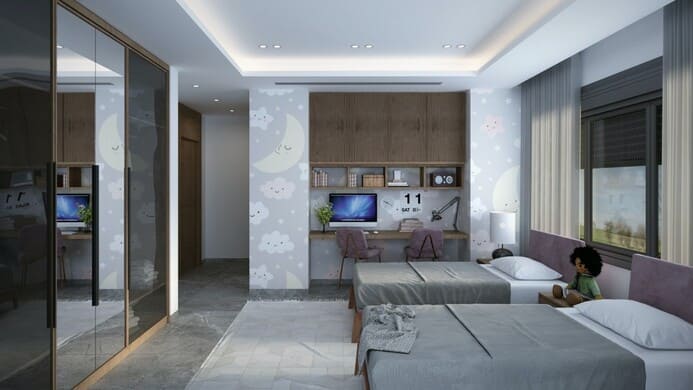Choosing the right glass for installation in windows is crucial for optimizing energy efficiency, reducing noise, and ensuring durability. By understanding each type of glass’s characteristics, advantages, and disadvantages, you can select the best option for your window glass installation project.
Types of Window Glass
Clear Glass:
Clear glass is the most common type used in window glass installation projects due to its transparency and ability to allow natural light to enter the space. It offers unobstructed views, making it ideal for locations where visibility is essential. However, clear glass has limited energy efficiency properties, allowing heat to transfer quickly and offering minimal protection against UV radiation.
Low-E Glass:
Low-E or low-emissivity glass reflects heat while allowing visible light to pass through. It contains a microscopically thin, transparent coating that reflects heat to its source. This type of glass is another popular choice for window glass installation projects. It improves energy efficiency by reducing heat transfer, keeping the interior cooler in summer and warmer in winter. Additionally, Low-E glass protects against harmful UV rays, preventing fading of furniture and flooring.
Tinted Glass:
The tinted glass features a film or coating that reduces glare and filters sunlight. It comes in various shades and can provide enhanced privacy by reducing visibility from the outside. Tinted glass also helps to reduce solar heat gain, making it beneficial in areas with intense sunlight. However, it limits the amount of natural light entering the space and may affect the aesthetics of the window.
Frosted Glass:
Frosted glass has a textured or translucent surface that provides privacy while allowing light diffusion. It is commonly used in bathrooms, offices, or partition walls. Frosted glass allows light to enter but diffuses it, preventing a clear view. It balances privacy and natural light transmission, creating a visually appealing effect.
Laminated Glass:
Multiple layers of glass with an interlayer give laminated glass superior strength and safety properties. In the event of breakage, the glass adheres to the interlayer, preventing it from shattering into sharp pieces. Laminated glass provides enhanced security, noise reduction, and protection against UV rays.
Insulated Glass:
Insulated glass, also known as double-glazing or double-pane glass, consists of two or more panes of glass separated by a gas-filled space, typically filled with argon or krypton gas. The gas acts as an insulator, reducing heat transfer through the window.
Insulated glass offers improved energy efficiency by minimizing heat loss in cold weather and heat gain in warm weather. It also helps reduce condensation and provides better sound insulation than single-pane glass. Insulated glass is a more common choice among Ottawa homeowners for window glass installation projects due to its higher energy efficiency.
Factors to Consider When Choosing Window Glass
Energy Efficiency:
When considering energy efficiency, look for glass with a low U-factor, which measures the heat transfer rate. A lower U-factor indicates better insulation. Additionally, check the Solar Heat Gain Coefficient (SHGC), which measures how much heat from sunlight is transmitted through the glass. Opt for glass with a low SHGC to minimize heat gain. Energy Star-certified windows meet stringent energy efficiency standards and can help you save on heating and cooling costs.
Noise Reduction:
Consider glass with a higher Sound Transmission Class (STC) rating to reduce noise transmission. STC measures how well a window or glass assembly can block sound. Glass with laminated layers or thicker glass panes can provide better noise reduction capabilities.
Durability and Strength:
Factors such as glass thickness, tempering, and impact resistance should be considered for durability and strength. Tempered glass is heat-treated to increase its strength and safety properties. Impact-resistant glass, such as laminated glass, is designed to withstand high-force impacts without shattering.
Common Questions About Window Glass Installation
What are the most energy-efficient window glass options?
The most energy-efficient options are Low-E glass and insulated glass. Low-E glass reflects heat while allowing light transmission, reducing energy loss. Insulated glass, with its multiple panes and gas-filled space, provides excellent insulation properties.
Which type of window glass is best for noise reduction?
Laminated glass is effective for noise reduction due to its sandwiched layers and viscoelastic interlayer, which absorb sound waves. The thickness and composition of laminated glass help minimize noise transmission.
How does tinted glass affect natural light transmission?
Tinted glass filters sunlight, reducing the amount of natural light that enters the space. The tint degree determines the light transmission level, with darker tints blocking more light.
What is the difference between single-pane and double-pane insulated glass?
Single-pane glass consists of one layer, while double-pane insulated glass has two layers separated by a gas-filled space. The insulating space in double-pane glass reduces heat transfer, resulting in better energy efficiency and improved sound insulation.
How long does window glass installation typically take?
The duration of window glass installation varies depending on factors such as the number of windows, accessibility, and the project’s complexity. A professional window glass installer can provide an estimate based on your specific situation.
What are the maintenance requirements for different types of window glass?
Maintenance requirements vary depending on the type of glass. Generally, regular cleaning with non-abrasive cleaners and soft materials is recommended.
Are there any additional costs associated with certain types of window glass?
Yes, certain types of window glass, such as Low-E glass and laminated glass, may have higher initial costs than standard clear glass. However, they offer long-term benefits such as energy savings and enhanced security.
Choosing the right window glass is essential for achieving energy efficiency, noise reduction, and durability. Consulting with window glass installation professionals can provide personalized advice to help you select the best glass for your specific needs.





